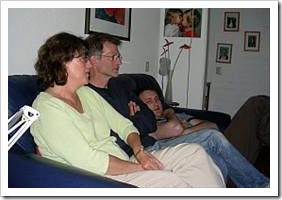 Parents do not like to admit, but their attitude and personality contributes a lot to their kids’ desire to watch TV. In this chapter of TV Diet, I will cover some of parents’ behaviors and personalities that drive kids to watch more and more TV.
Parents do not like to admit, but their attitude and personality contributes a lot to their kids’ desire to watch TV. In this chapter of TV Diet, I will cover some of parents’ behaviors and personalities that drive kids to watch more and more TV.
As you read, I hope you do not find yourself there, but if you do, do not despair. You can turn things around. Of course, as is the “Family Matters” tradition, change will start with you and I will give you the solution (later in the series, so subscribe or come back to read).
“Too busy” parents
I work with many parents on their concerns with their kids watching too much TV. When we talk about solutions, they often say, “I’m too busy”, “I don’t have time”, “I can’t follow up on this” or “I’m not there to monitor their TV habits”.
It is very simple. Kids whose parents are too busy make TV decisions on their own without any filters. Unfortunately, they are too young to choose the TV shows and ads that suit them. Without adult supervision, it is also a big challenge to change their habits.
If your kids watch too much TV, ask yourself, “Am I too busy?”
“TV addict” parents
 As I have said many times in many posts on this blog, kids are our mirrors – small but sometimes cruel. When parents are addicted to TV, their kids think this is “normal” and “acceptable” and they cannot see any problem with watching too much TV. When Mom or Dad change routines and plan their life around TV shows, kids think it is probably OK.
As I have said many times in many posts on this blog, kids are our mirrors – small but sometimes cruel. When parents are addicted to TV, their kids think this is “normal” and “acceptable” and they cannot see any problem with watching too much TV. When Mom or Dad change routines and plan their life around TV shows, kids think it is probably OK.
To discover if you are watching too much TV, record your own TV week, as you have done with your kids. How many times a week do you watch TV? What kind of shows do you watch? How much do you change your schedule around TV shows?
Here are some signs of TV addition:
- If you get up in the morning and turn the TV on – you are addicted.
- If you say, “I have to watch this”, and work your life around a show – you are addicted.
- If you need others to clear everything for you while you are watching TV – you are addicted (and you are teaching your kids to be selfish and rude).
- If you cannot come up with any ideas for keeping yourself busy except watching TV – you are addicted.
If you are addicted, your kids are more than likely to adopt this attitude, so you and your kids need help.
Anti-social parents
Parents who lack social skills and are not very friendly raise kids who lack social skills, are less friendly and prefer staring at a TV screen to playing with friends.
Parents are the strongest role models for their kids. Recently, I took a group of 30 kids from 5 different schools to a leadership camp. Before the camp, I asked the kids to send me some info about themselves and one of the questions they had to answer was “Who is the person that influenced me most?” What do you know? Most of the kids wrote Mom, Dad or both.
If your kid is not very friendly and prefers the TV to playing with friends, it may be time to check yourself. How many friends do you have? How often do you see them? How many times do you just turn on the TV instead of going out with friends?
Single parents and divorced parents
 One big influence on kids’ TV binging is the relationship between their mom and dad. Even when Mom and Dad are together, it is hard to overcome TV addiction, but when Mom and Dad are in conflict, the situation really gets out of control.
One big influence on kids’ TV binging is the relationship between their mom and dad. Even when Mom and Dad are together, it is hard to overcome TV addiction, but when Mom and Dad are in conflict, the situation really gets out of control.
Usually, when kids do not get the same message, they tend to curl up and look for easy comfort. TV provide great comfort for kids who live in different houses. When Mom does something the kids do not like, they say, “But Dad lets us” (and vice versa). Also, moving back and forth between houses, at least the shows on TV are the same…
Single parents have less time to monitor their kids and are so stressed that sometimes they feel guilty and let their kids have their way and get some comfort.
Kids living with single parents or divorced parents watch more TV than kids who grow up in a home with both their parents.
Less educated parents
Research has found that educated parents are more concerned about the effects of TV on their kids and monitor it more closely than uneducated parents.
Kids of educated parents read more books and watch less TV than kids of uneducated parents.
Parents’ education is no guarantee that kids’ will watch less TV, but generally, educated parents expect more of their kids, keeping them occupied with more studies and extra-curricular activities and that puts their kids in a better position.
Educated parents may still be busy, but they encourage their kids to watch more educational programs on TV.
Educated parents may still watch too much TV themselves, but they will talk to their kids more about it and watch it with them so the negative effect of some of the programs shrinks a bit.
Poor parents
Unfortunately, economic circumstances have an influence on watching TV. Today, every house has a TV and parents in the low socio-economic range of society are more subject to addictions, to time pressure, to not being around to monitor their kids’ watching habits or to offer them alternatives.
It is wrong to think that low finances are an overriding factor. I personally know poor people who can keep their kids busy without money at all. This is a general statement that is not relevant to all. However, it explains the relationship between socio-economic circumstances and the tendency to find cheap and easy ways to keep kids busy.
Parents who “can’t be bothered”
 Parenting is a lifetime job that comes without a job description and you discover everything you need to know through trial and error. For some parents, parenting is just too much. Whenever I meet someone like that, I wonder if they understood what they were getting themselves into when they decided to become parents.
Parenting is a lifetime job that comes without a job description and you discover everything you need to know through trial and error. For some parents, parenting is just too much. Whenever I meet someone like that, I wonder if they understood what they were getting themselves into when they decided to become parents.
Those parents think that raising kids is just a matter of washing, feeding, cleaning, and sending to school… They do not have a philosophy on life and flow through life by continuing the behaviors and traditions of their parents who have done exactly the same.
Parents who “can’t be bothered” will not bother with their kids’ TV habits and say things like, “I watched a lot of TV when I was a kid and nothing bad happened to me”…
Sadly, these parents are not likely to read this post.
“Let’s make life easy” parents
For others, parenting is too hard, so their mission in life is to make it easy NOW, without really thinking about the long term.
It is these parents who say
- “He’s not happy. Let him watch whatever he wants”
- “This is the only way she eats – in front of the TV”
- “She’ll be so sad, I could never take the TV away from her”
- “This show is his life. I could never do this to him”
- “The TV is their comfort. They just love it”
- “It makes them happy and this is all I want” (some drugs make you happy too, so what are they saying?)
If you give your kids discounts and try to make life easy by having guilt feelings about limiting their TV or if you are too afraid of conflicts, your kids are more likely to watch more TV than others. Just take this into consideration.
For parents who think TV rules restrict children and take some essential freedom from them, it is good to remember that your kids know you are thinking like this and will take advantage of it.
Statistics shows that the kids of “Let’s make life easy parents watch 10 times more TV on weekends and 5 more times during school days than the average.
Dads
As hard as this may be to report:
 Moms are generally more concerned about TV watching than dads.
Moms are generally more concerned about TV watching than dads.- Generally, dads think more positively about watching TV than moms.
- Generally, dads watch more sports and model this behavior to their kids.
- Generally, dads are less concerned about sexuality and violence on TV.
The funny bit about dads is that although they are very relaxed and easygoing with their sons with respect to TV, they are very protective about their daughters’ exposure to sexuality on TV.
Dads, watch your attitude, because your kids are watching you!
Moms, monitor your partners’ attitude, because your kids are watching them!
Join us next week to find out the right TV diet.
I hope you have not found yourself reflected in any of the parent types above, but if you have, it only means you are at the right place, so keep reading and I promise you will find solutions soon.
Happy parenting,
Ronit
This post is part of the series TV Diet:
- TV Diet (1): Too Much TV?
- TV Diet (2): Health Concerns
- TV Diet (3): Kids Behaving Badly
- TV Diet (4): Kids’ Outlook on Life
- TV Diet (5): Parent-Child Relationships
- TV Diet (6): Disposable relationships
- TV Diet (7): Learning and Education
- TV Diet (8): How Much TV is Too Much?
- TV Diet (9): Kids’ Personalities
- TV Diet (10): Parents’ Influence
- TV Diet (11): The Right TV diet
- TV Diet (12): Junk TV
- TV Diet (13): Raising Aware Kids
- TV Diet (14): Cutting Junk TV
- TV Diet (15): Routine
- TV Diet (16): Healthy Alternatives
- TV Diet (17): More Healthy Alternatives
- TV Diet (18): Conclusion
 Moms are generally more concerned about TV watching than dads.
Moms are generally more concerned about TV watching than dads.










